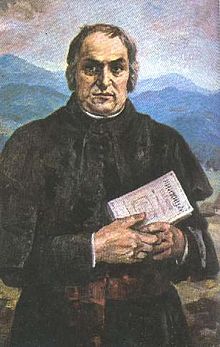| Revision as of 03:47, 8 February 2009 editHillock65 (talk | contribs)4,431 edits Undid revision 269203852 by 92.104.232.89 (talk)← Previous edit | Revision as of 14:23, 25 April 2009 edit undoDragonBot (talk | contribs)56,554 editsm robot Adding: ru:Духнович, Александр ВасильевичNext edit → | ||
| Line 66: | Line 66: | ||
| ] | ] | ||
| ] | ] | ||
| ] | |||
| ] | ] | ||
| ] | ] | ||
Revision as of 14:23, 25 April 2009
| Oleksandr Dukhnovych Олександр Духнович | |
|---|---|
 | |
| Occupation | Priest, poet, writer, pedagogue, and social activist |
| Nationality | Ruthenian, Rusyn, Ukrainian |
Oleksandr Vasylovych Dukhnovych (Template:Lang-uk; Template:Lang-ry; Template:Lang-sk) (April 24, 1803—March 30, 1865) was a priest, poet, writer, pedagogue, and social activist of the Rusyn and Ukrainian nations.
Life
Oleksandr Dukhnovych was born in the village of Topoľa (now Eastern Slovakia). The son of a Greek Catholic priest, he went to a Hungarian school in Uzhhorod (1816 to 1821). Later Oleksandr studied philosophy at an academy in Košice (1821-1823), and theology at the Theological Seminary in Uzhhorod (1824-1827).
In (1827 - 1830 and 1832), Dukhnovych worked as an archivist and a teacher. Later, in 1833-1838, he worked as a Uniate priest in remote villages of Carpathian Ruthenia (present day Zakarpattia oblast of Ukraine) and as a notary in Uzhhorod (1838 - 1844). Dukhnovych started to write poems in his early years. He wrote in the Ruthenian, Russian, and Hungarian languages. His early works are said to have been influenced by Hungarian Romanticism.
Dukhnovych supported education and cultural revival of Carpathian Ruthenians. He saw his role as a defender of Ruthenian culture against Magyarization. In 1850 Dukhnovych established the first Ruthenian cultural association, the Prešov Literary Society. The society under his guidance published a series of books. His most famous patriotic poem Ia rusyn byl, ies'm i budu (I Was, Am, and Will Be a Ruthenian) was published as part of an anthology in 1851. This poem would later become the national anthem of Carpatho-Ruthenians. Dukhnovych also published a number of pedagogical and religious books, elementary school textbook and a Grammar. His most famous scholarly works were The History of the Eparchy of Prjašev (1877), originally published in Latin and later translated in Russian and English, and a History of Carpathian Ruthenians (1853).
His last years were devoted to development of education and schooling among local Ruthenians. In an effort to forestall the Magyarization of the Ruthenian population Dukhnovych founded in Prešov together with Adolf Dobryansky the St. John the Baptist Society (1862). On March 30, 1865 Dukhnovych died in Prešov.
Assessment
Dukhnovych is regarded to be one of the outstanding Ukrainian and Ruthenian humanists and educators. In words of Ivan Franko "he made everything so that forgotten Ruthenians revived spiritually". His views were based on Christian principles and idealism.
Dukhnovych also actively participated in the Moscophile (Russophile) (Москвофільство) movement in Western Ukraine at the end of the 19th century. Even though Dukhnovych wrote in the local language he did not believe it to be a separate language nor did he wish to contribute to a creation of a literary language of Carpathian Ruthenians. Instead Dukhnovych wrote his scholarly works in a peculiar dialect called iazychie made of Russian, Church-Slavonic and local Ukrainian.
He also believed Ruthenians to be one people with Russians and therefore advocated for closer cultural ties with Russia.
See also
References
- litopys.org.ua - Oleksandr Dukhnovych
- Ukrainian Misplaced Pages - Moskofilstvo
- Dukhnovych, Aleksander at the World Academy of Rusyn Culture
- Orest Subtelny. Ukraine. A history. University of Toronto press. 1994. ISBN 0-8020-0591-0.
- Oleksander Dukhnovych at the on-line Encyclopedia of Ukraine